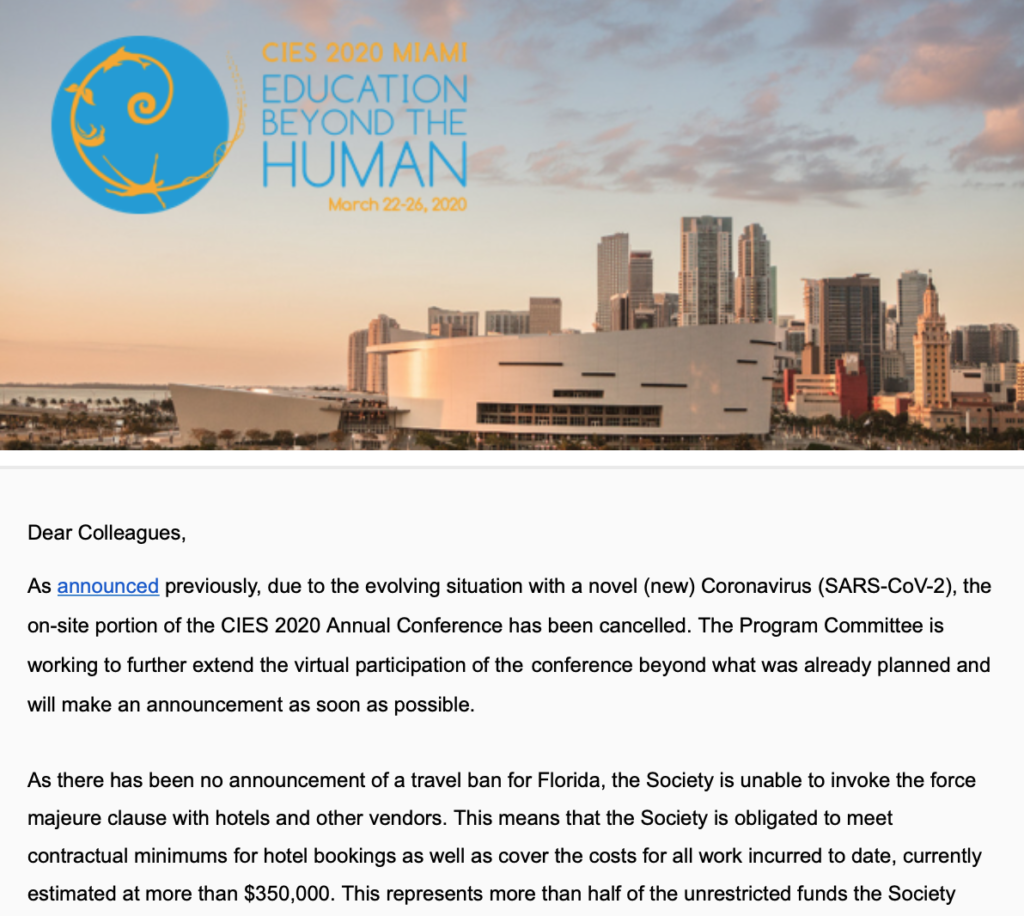
Covid-19 has caused the cancelation of countless meetings, conferences, and public gatherings. This has undoubtedly helped to reduce the spread of the virus by encouraging social distancing and stopping super-spreaders. The second order of business is to determine what these canceled meetings and conferences mean in financial terms. Large amounts of money inevitably will be lost, but the burden will not be equitably shared. Apropos to global economic inequality, it seems corporations will fare much better than the individual. Let’s look at the case of the Comparative and International Education Society (CIES) for some insight into this secondary issue.
On March 5, the Board of Directors of CIES canceled its annual conference, which was scheduled to begin in Miami on March 22, writing in its email to members that it was doing so “in consideration of the health and safety of conference participants.” The announcement, which many on Twitter supported despite feeling disappointed at missing a week in sunny Miami, also reminded members that the “Board has a fiduciary responsibility to the Society” and would be “reviewing the financial implications of this decision” in the coming days.
Five days later, on March 10th, the Board wrote members a second email outlining the financial fallout from its decision the week before. The letter was unusual for its openness regarding financial issues (stating, for example, the exact dollar amount it was set to lose) and for its rule by fiat (creating, for example, new cancelation policies ex post facto in order to prevent the shuttering of the Society). In short, the letter explained that the Society was required to pay Hyatt Hotels and other vendors despite the canceled event, so registration fees would not be reimbursed, except for student members and members from low-income countries. Donations were also solicited to minimize the financial burden on the Society. Effectively, Hyatt Hotels passed financial risk to CIES and CIES subsequently passed the risk to its members, with a small relief program set up for its most vulnerable members (not including those in precarious positions, as Vidur Chopra rightly pointed out on Twitter).
I would like to examine the March 10th letter in more detail to highlight questions left unanswered (despite its supposed transparency) and the extent to which CIES has been captured by the interests of intermediary services, a topic I wrote about last year. Intermediary services are outsourced accounting, legal, and management services and are increasingly common in academic societies. These services are typically justified by the concept of professionalization: A society needs intermediary services because elected board members cannot manage the complex demands of large organizations. However, outsourcing various tasks to for-profit companies ultimately changes the logic of non-profit societies away from academic association towards profit motives. Intermediary service fees are also expensive, accounting for a large percent of annual expenditures without generating any revenue. In extreme cases such as the global health crisis we now face, these often-hidden logics of academic societies are visible for all to see. These logics aim to privatize and protect profits for intermediary service providers while they socialize risk and loses to individual members.
In the letter, the case was made that the Society was in financial dire straits because of the canceled annual conference. The letter stated, “as can be seen from past Treasurer’s reports, our conferences are not intended to make money for the Society, but rather to break even.” Not generating revenue from the conference while being held responsible for the expenses would require the society to draw down money in its “operational account” to cover the losses. I do not disagree that the society would need to draw on its operational account to cover some of the costs.
However, is it true that annual conferences do not make money? Let’s take the Treasurer’s report for the year ending December 31, 2018. The annual conference brought in a revenue of $618,560 and cost $604,423. The Society therefore made $14,137 from the conference in 2018. That might not be a lot of money, but it is still a profit. Nevertheless, let’s chalk that amount up to more-or-less breaking even.
The key word in the email is “intended.” What’s the intention of the society when it comes to conferences? One way to answer that question is by looking at future budgets, where the society details what it hopes to happen in the coming year. The CIES Annual Budget for 2019 projected income generated by the annual conference would be $642,800. What were the intended costs for the conference? $534,640. That’s an expected profit of $108,160! That is far from breaking even and shows the intent of the Board is to make a profit from the conferences. This is an example that shows how our Society has intentionally moved away from academic association and towards profit maximization.
The lost money to Hyatt hotels puts the society in a difficult position. The letter offered a binary choice: Either the Society needed to draw down money from its operational account to pay off conference expenses, or it needed to keep conference registration fees, the largest portion of conference revenue. The letter read, “such a withdrawal [from its operational account] would require the termination of the Society and its operations as we would no longer be able to meet our financial obligations.” When the choice is either to shut the Society or keep registration fees, the answer is easy for most members of CIES: keep my money so the society can survive.
As in most binary choices, however, the matter is not so clear cut. Left unsaid in the letter was the cost of intermediary services, the second largest expense after conferences. Like the canceled conference, these are expenses that do not generate revenue. The difference is that intermediary services nevergenerate revenue, even in the best of times. In fact, they exist to collect fees and generate profit for themselves.
How much do intermediary services cost the Society? The 2019 budget estimated that intermediary services (called supporting services) would cost the Society $405,580. In light of the canceled conference, this begs the question: Could not CIES reduce expenses on intermediary services to increase its operational account? This would mean the Society could have extra money to refund conference registration fees to members and absorb the lost revenue without having to shut its doors.
The larger issue is that the cost of intermediary services shows the extent to which the Society – a not-for-profit organization – pays private companies. At 35 percent of total operating expenses in the 2019 annual budget, intermediary services extract yearly concessions from the society. Are they worth the cost?
As I watch the damage caused by COVID-19 slowly spreading worldwide, I am convinced this is an opportunity to re-make our social institutions. This crisis could allow CIES to break free from the privatization of academic conferences. CIES should end the unnecessary growth of intermediary services. To do so will take vision and leadership and democratic mechanisms to empower members. The real tragedy of CIES 2020 will be if everything returns back to business as usual in 2021.
